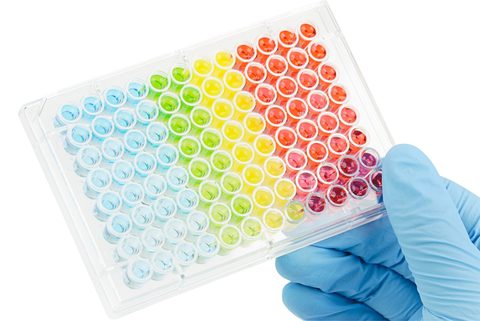

Improving a Customer's Enzyme Assay to ensure Product Viability
A robust assay that can be validated is an important part of any enzyme development process or technical transfer of an enzyme to a new manufacturing facility.
Ensuring that you have a robust assay that can be validated is an important part of any enzyme development process or technical transfer of an enzyme to a new manufacturing facility. Being confident that the assay for any given enzyme is fully reproducible gives assurance that the enzyme always meets the required specification. It is also very important when looking to optimise the different stages of the manufacturing process; from fermentation through to enzyme recovery in the downstream processing stages, ensuring that any adjustment to the process can be monitored to show if there is an improvement in the process is crucial. Biocatalysts Ltd has over 35 years’ experience developing and using enzyme assays. We have experience with over 100 different assays using simple to highly complex analytical techniques. Our customers value Biocatalysts’ expertise in this field.
We developed a manufacturing process for a Taq polymerase that is used in genomic applications. The customer required the enzyme to have an extremely low level of background DNA to prevent false positive results. Therefore, it was important to be able to assay the enzyme for residual DNA reliably, accurately and reproducibly on different days, using different reagents, and between operators and sites.
To reliably assess the level of DNA present in the Taq polymerase product. The assay was originally provided to Biocatalysts by the customer but was problematic due to unacceptable assay variability and the length of time the assay took to produce results.
A technical team was put together jointly between Biocatalysts and the customer. This team completed a thorough investigation and route cause analysis to establish exactly what the issues were with the assay. Several recommendations were made by the assay team to improve the reproducibility of the assay. Biocatalysts then applied these recommendations to the assay and reviewed the results to develop a new assay protocol.
Biocatalysts’ assay team then travelled to the customer site for a face-to-face two-way technical assay transfer with the company scientist responsible for performing the assay. Within three weeks of identifying there was an issue with the assay, a new robust assay was developed and producing consistent results that were reproducible at both the customer site and Biocatalysts.
Working together with the customer, we were able to take an unreliable assay and modify it to produce an assay that gave consistent, accurate and reproducible results, ensuring a safe level of residual DNA was reported confidently. By working very closely with the customer and communicating at each stage of the process, we not only resolved the issues we were experiencing but improved the relationship with the customer. The assay now works efficiently alongside 5 other performance and specification assays used to ensure consistent batches of Taq polymerase are delivered to this customer.
You can be assured that what Biocatalysts Ltd provides in assay development to support your enzyme discovery, development and scale up are based on:
- 35 years of developing expertise in assay development and use
- Dedicated assay team
- A fully documented (ISO 9001: 2015) assay design procedure
- >100 assays developed
- >50 assays routinely used by QC department
- Selection of the best analytical techniques from spectrophotometry, to liquid chromatography including use of high through put robotics
*The Andrew+ robot system https://www.andrewalliance.com/pipetting-robot/ provides an ideal low to medium throughput solution for an automated pipetting station. Labware such as tubes, microplates, pipette tips etc., are placed in specialised holding units called Dominos which join together magnetically in an arrangement determined for the user by the OneLab Cloud-based control software. This system provides an excellent platform for automated 96 well microplate enzyme assay development.